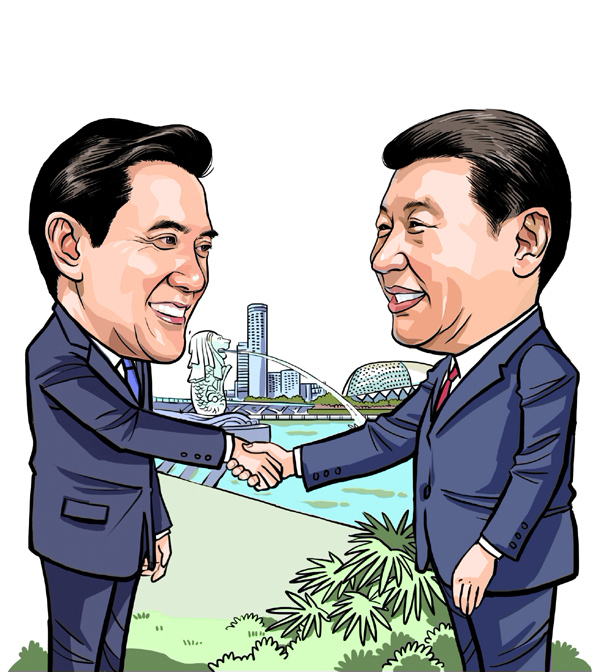Let pragmatism lead the way
Updated: 2015-11-08 11:00
(China Daily)
|
|||||||||||
 |
| Li Min/China Daily |
Over the past few days, the media have been lavish in their praise of the meet ing between top leaders of the Chinese mainland and Taiwan, using complimentary words such as "land mark" and "milestone" to describe it.
When Xi Jinping and Ma Yingjeou met under inter national media spotlight in Singapore on Saturday, they opened a new page in crossTaiwan Straits ties. A mountain of words can be used to dwell on the significance of the Xi-Ma meeting. But it's more meaningful to explore what made such an event take place, in order to carry forward the momentum of the meeting to further boost bilateral ties.
Few people could have forecast the toplevel meeting given the tense relations across the Straits in the first eight years of this century, when the "proindepend ence" Democratic Progressive Party was the ruling party on the island. The two sides once exchanged a battery of words and blamed each other for mutual mistrust.
However, the developments of the past more than six years show that only through pragmatism can the mainland and Taiwan have a permanent rapproche ment, gradually but certainly.
Without pragmatism the Wang-Koo talks wouldn't have been held in Singapore in 1993, which laid the foundation for semi-official contact across the Straits. As the mainland's Association for Relations Across the Taiwan Straits, then led by Wang Daohan, and Taiwan's Straits Exchange Foundation, then headed by Koo Chenfu, were authorized to handle cross Straits affairs in the absence of official ties between the mainland and Taiwan. The model helped the two sides shelve the sensitive issue of recognizing each other's political legitimacy.
Without pragmatism, resumption of the three crossStraits links of direct trade, transport and post al services wouldn't have been possible in 2008 after being banned for almost 50 years. Even when Chen Shuibian, leader of the then ruling DPP, advocated the pursuit of Taiwan "independence", the mainland did not abandon its push for establishing the three links. Reestablishing the links strengthened the economic and cultural bond between people across the Straits through closer exchanges.
Without pragmatism the year 2005 wouldn't have seen Lien Chan, then Kuomintang chairman, visiting the mainland, a first in 56 years. His meeting with Hu Jintao, then general secretary of the Communist Par ty of China Central Committee, paved the way for regular top level contacts between the two parties and eased crossStraits tensions that were created by the DPP's separatist push.
And without pragmatism, there wouldn't have been mutual recognition of official titles between Zhang Zhijun, head of Taiwan Affairs Office, and Wang Yuchi, then chief of the Mainland Affairs Council on February 11, 2014, a first in 65 years. It quietly, but conclusively, removed the historical bur den of political nonrecognition of each other.
Built on a series of pragmatic moves over the past two decades, the top leaders' meeting became reality after 66 years of waiting - a major breakthrough for both sides and a surprise for many. This wouldn't have happened if the mainland had refused to give Ma an equal footing and if Ma took the meeting as a form of degradation. In this sense, even the XiMa handshake and dinner are of historic significance, reflecting their commitment to pursuing crossStraits peace.
Pragmatism has played its part. Now, both sides will and should continue to rely on it to build a future when both sides are ready to sign a peace agreement to end their decadesold state of rivalry, no matter which party is in power on the island.
Today's Top News
Two pandas moving to Dutch zoo from China
UK unveils new spying powers, raising privacy fears
UN chief commends efforts by China, France to push for climate pact
China and Europe to jointly fund scientific research and innovation
Merkel calls for European solution to refugee crisis
China, France made progress in nuclear energy cooperation
More than 100 UK investment projects revealed
Hollande highlights green growth during visit
Hot Topics
Lunar probe , China growth forecasts, Emission rules get tougher, China seen through 'colored lens', International board,
Editor's Picks

|

|

|

|

|

|






